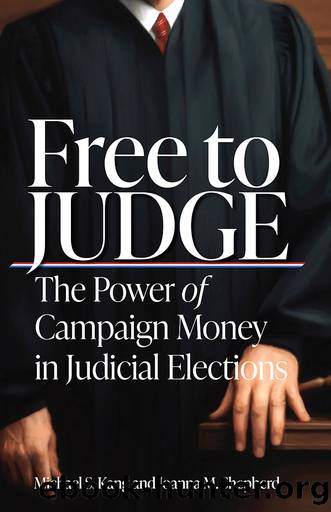Free to Judge by Michael Kang

Author:Michael Kang
Language: eng
Format: epub
Publisher: Stanford University Press
Published: 2023-08-15T00:00:00+00:00
As we just explained, we can think of at least two important alternative pathways. The first is what social scientists would call a selection effect. Consider the perspective of a campaign donor with a clear set of policy views. To whom do you want to give your money? Someone who shares your views in the first place. As Senator Bill Bradley once put it, âMoney not only determines who is elected, it determines who runs for office.â27 Candidates who already share your ideological views are likely to be attractive candidates for you to support. If you are pro-business, youâll seek out and support pro-business candidates. If you are pro-regulation, youâll seek out and support pro-regulation candidates, and so on.
In addition, candidates with more campaign finance support would, by virtue of those resources, be more likely to be elected. Once elected, those candidates would represent the views of their like-minded donors as they do their jobs as judges. In the end, then, campaign finance support from left-leaning donors would be correlated with left-leaning votes by the candidates they supported. And this happens, at least in part, because left-leaning donors directed money disproportionately to judges they anticipated would vote in their favor and made the right picks. The same would be true for right-leaning donors and right-leaning candidates as well. In the end, the money would line up with judgesâ decisions.
A second pathway by which campaign financing might correlate with judicial voting is more direct and perhaps even more worrisomeâoutright biasing. Letâs assume that candidates may, or may not, be predisposed to the views of prospective campaign donors. However, candidates, and subsequently judges when they reach the bench, know the views of many wealthy campaign donors out there. They especially know the ideological views of their own campaign donors who have supported them in the past, and with whom they already have working relationships. As Bridget McCormack explained to us, âYou go to these [fundraising] events, and people would say âWell, what can you do for me?â which is a fair question to ask of most politicians running for office.â Whatâs more, judges know that they probably need continued campaign contributions from these donors to win re-election. They definitely know that they risk not receiving these needed contributions in the future if they donât vote as their donors expect them to vote.
As a consequence, even when judges donât think the contributorsâ views should win out in a particular case, they still may feel pressure to vote as their contributors want. Rather than worry about losing campaign contributions for the next election fight, justices may cover their bases and vote a little differently than they otherwise would, biasing themselves toward their contributorsâ views. A former chief justice of the Tennessee Supreme Court explained that âwhether subtle or unintentional or not, there may be a tendency in the future for appellate judges to have one eye looking over their shoulder.â28 This biasing effect means justices would decide cases differently than they otherwise would, or
Download
This site does not store any files on its server. We only index and link to content provided by other sites. Please contact the content providers to delete copyright contents if any and email us, we'll remove relevant links or contents immediately.
| Comparative | Conflict of Laws |
| Customary | Gender & the Law |
| Judicial System | Jurisprudence |
| Natural Law | Non-US Legal Systems |
| Science & Technology |
American Kingpin by Nick Bilton(3872)
Future Crimes by Marc Goodman(3591)
The Meaning of the Library by unknow(2564)
Inside the Middle East by Avi Melamed(2349)
Why Nations Fail: The Origins of Power, Prosperity, and Poverty by Daron Acemoglu & James Robinson(2283)
On Tyranny by Timothy Snyder(2227)
Living Silence in Burma by Christina Fink(2059)
Putin's Labyrinth(2016)
The Mastermind by Evan Ratliff(1933)
The Smartest Kids in the World by Amanda Ripley(1843)
Think Like a Rocket Scientist by Ozan Varol(1813)
Law: A Very Short Introduction by Raymond Wacks(1736)
It's Our Turn to Eat by Michela Wrong(1720)
The Rule of Law by Bingham Tom(1689)
Philosophy of law a very short introduction by Raymond Wacks(1654)
Leadership by Doris Kearns Goodwin(1632)
A Dirty War by Anna Politkovskaya(1626)
Information and Communications Security by Jianying Zhou & Xiapu Luo & Qingni Shen & Zhen Xu(1611)
Civil Procedure (Aspen Casebooks) by Stephen C. Yeazell(1553)
